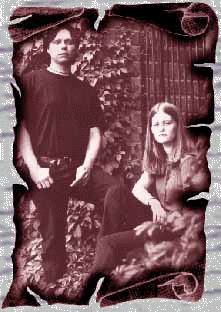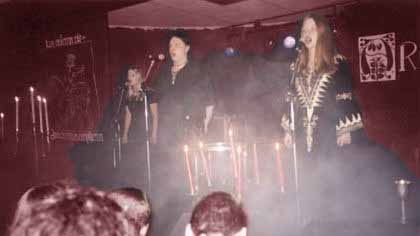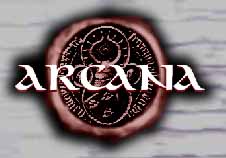 Featuring:
Featuring: • Arcana
• Roger Karmanik
• Mortiis
• Ordo Equilibrio
...and various reviews.

The first battle was won. "Dark Age of Reason" was highly praised by both the critics and the fans. A few shows followed and less than a year after the recordings for their debut took place, Arcana were back in the studio taking care of their second full length album.
By June 1997 and earlier than what anyone had expected, "Cantar de Procella - the Songs of the Storm", Arcana's second full length album, was released.
As hinted at in the two songs present on "Lizabeth", "Cantar..." brought a few changes. The band lost none of the glorious and epic might of "Dark Age...", yet chose to deliver it in a more intense and bright manner, leaving it up to 'The Opening of the Wound' to link both works...
The music is luxuriously orchestrated again although still simple in its structuring, yet the performances show improvement, especially the ones of Ida. The doomy, march-like pace of 'Chant of the Awakening' takes you on a torturous and depressive journey that reaches 'The Song of Solitude', where Ida dares to indulge in an accapela workout whose title could not be more appropriate. Now more than ever, on Arcana the vocals and choirs are used no longer as mere add-ons, but as instruments - various chants and vocal harmonies which are deprived of any lyrical content are to be found on "Cantar de Procella".
'Void of Silence' sways gently and monotonously onto 'Cantar de Procella', where Peter supplies a simple harpsichord riff for Ida's vocals and additional arrangements to lay upon. The bold orchestrations and female choirs on 'Aeterna Doloris' should set this as one of Arcana's most epic pieces, along with 'The Opening of the Wound' and its huge choirs. 'The Song of Preparation' is build around male choirs and anticipates 'God of the Winds', yet another smooth and epic dirge that blossoms calmly. 'The Dreams Made of Sand' and 'La Salva de Profundis' use a formula similar to the title track yet with different instrumentation (a monotonous background melody from which things grows into majestic proportions) and 'Gathering of the Storm' seems to transport Arcana into a more contemporary Neo-Classical musical frame with a less Medieval aura which suits them quite well too. I'd say that this song in particular could quite easily have been written by Dead Can Dance. Finally, 'The Tree Within' and its drifting strings along with Ida's soaring vocals bid you farewell in a blissful and serene manner as you return to the real world...
Finally, the interview with Peter Pettersson.
 Is there a special reason why you chose music, and more precisely, the music that you create with Arcana, to express your feelings and in what way do you think that you manage to put them onto the music? What do you value most about your music?
Is there a special reason why you chose music, and more precisely, the music that you create with Arcana, to express your feelings and in what way do you think that you manage to put them onto the music? What do you value most about your music?• I have always known that music was my way of expressing myself, why I make the kind of music I do is not very strange since as a child I loved the film-music and classical music, and to write my music in minor is just so natural for me, I would feel that I was lying if I wrote music in major.
I've seen Arcana compared to Dead Can Dance a few times. How do you feel about this comparison?Are there any musicians that you find essential for your development as artists and how would you like people to think of Arcana's music, how would you describe it? Could you compare it to any physical or mental experience?
• Dead Can Dance have been a very important thing for me, they kind of directed me in this direction. They were probably the first band to really reflect 90% of the image of what I wanted to do. It's really hard for me to say how I want Arcana to be experienced, I don't want it to be described as Ambient music that goes well with sleepy moments, or perhaps it's ok anyway... Well it's hard because I want people to make up their own minds about us, if I can make someone forget about their economical problems and so on, I'm happy!
How much of one's personal life and experiences do you think that one should use for the creation of his art? I personally think that composing music, writing or whatever are the best forms of dealing with one's frustrations, problems, etc. Do you agree with me and is this what Arcana means to you?
• I agree totally, I feel that it's up to the one that expresses to decide how much you should express. To me it's the only thing that keeps Arcana going, I don't think that I could write music without feeling anything. And on the other hand I don't think that I could live properly without expressing myself so this is a complete circle.
Much of the imagery around Arcana and especially your music, has a quite 'ecclesiastical' vibe. In what way do you relate to the divine, do you have any opinion towards religion that has been in some way influential to your work with Arcana or whatever?
• Not really, I do not consider myself as a religious person. But I would not say that I'm an atheist either, I just live and devour impressions and then let them out through my eyes. I have developed a quite doubtful view on, let's say Christianity. People hide behind their beliefs and raise their children through a book that was written so long ago. It's time for people to make up their own minds about how to live.

You have already done some live shows with Arcana. What can you tell us about that and how do you recreate the atmosphere of your studio work on stage? I personally think that this sort of music has better results if heard in seclusion, I can't quite picture it in a live environment... Does your music works well live?
• Well, I felt that Belgium was a really beautiful experience, everything was so nice. We have got two medieval flags and a big logo from our dear friend Mark Riddick (...the Soil Bleeds Black), that really bring up the performance. I feel that under the right circumstances, I reach the heavens.
To finish, I'd like you to sum up in a few sentences what Arcana is about and to end this the best way you see fit. Thanks for your time, it's been a pleasure!
• Thank you too, well I feel that these years have been very interesting and giving, and I must also say that the response that we've got really warmed our hearts. I guess that we'll meet within the realm of sounds some time...
• Arcana "Dark Age of Reason"
CD 1996, Cold Meat Industry
• Arcana "Lizabeth;
CDSingle 1997, Cold Meat Industry
• Arcana "Cantar de Procella"
CD 1997, Cold Meat Industry

Official Arcana Homepage